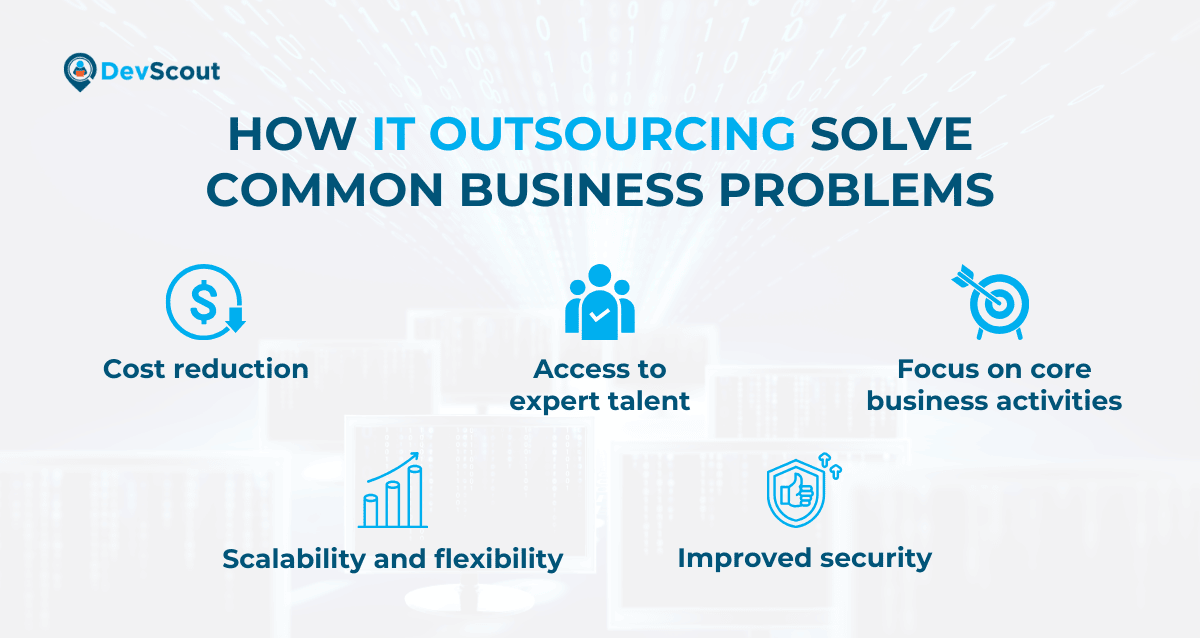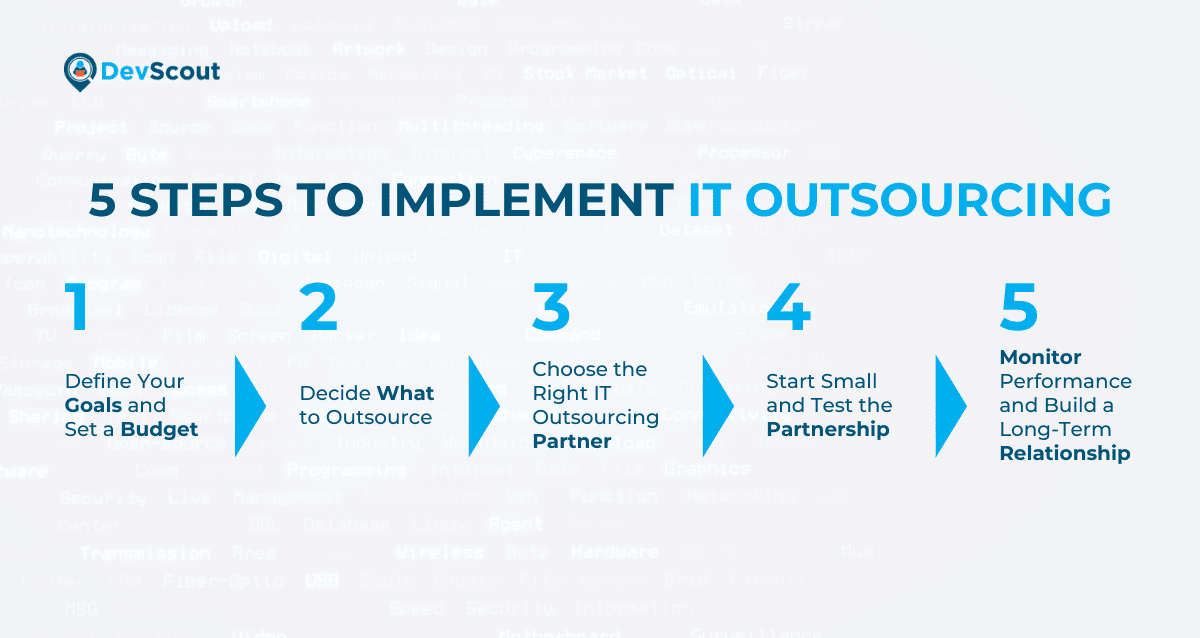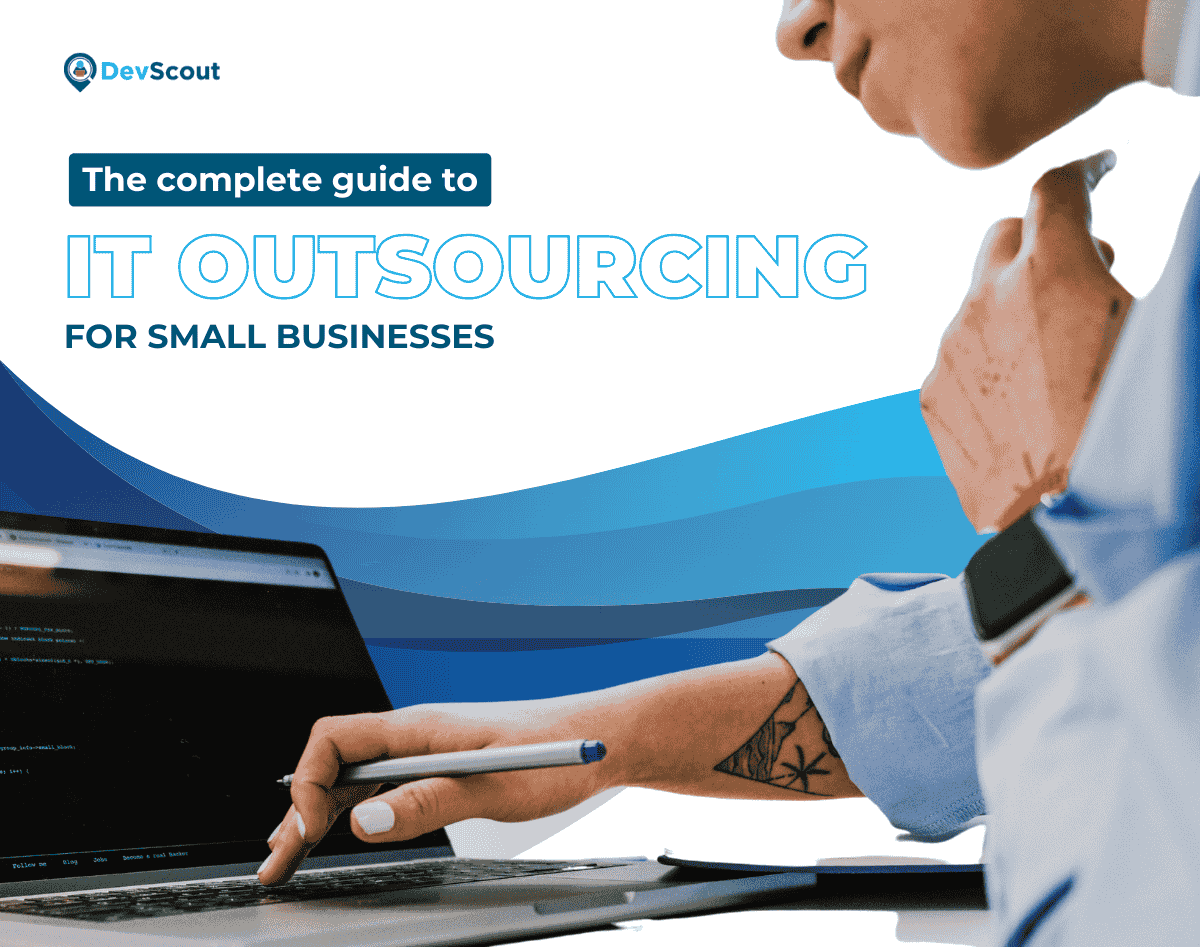The Complete Guide to IT Outsourcing for Small Businesses
Small businesses face growing challenges in managing IT, with limited resources and expertise making them vulnerable to risks like cybersecurity threats. According to Accenture’s Cost of Cybercrime Study, 43% of cyberattacks target small businesses, underscoring the urgent need for robust IT solutions. IT Outsourcing for Small Businesses provides access to skilled professionals and advanced technology, tackling challenges such as cybersecurity, system upgrades, and IT support. By outsourcing, businesses can cut costs, boost productivity, and focus on growth while leaving the technical complexities to experts. This guide explores how to leverage IT outsourcing, choose the right partner, and align strategies with your goals for lasting success.
IT Outsourcing for Small Businesses: How It Solves Common Challenges
Common Challenges Faced by Small Businesses
Small businesses face a variety of challenges that can limit their ability to grow and succeed. One of the most pressing issues is limited resources. Many small businesses operate with a tight budget, making it difficult to invest in advanced IT infrastructure or hire dedicated IT professionals. According to a survey, 60% of small businesses cite cash flow as a significant concern, meaning they have limited financial flexibility to address technology needs.
Another challenge is staying up-to-date with rapidly changing technology. Small businesses often struggle to keep up with software updates, cybersecurity threats, and new tools that could improve efficiency. A study by Business News Daily found that 43% of cyberattacks target small businesses, leaving them vulnerable to data breaches and financial loss.
Moreover, many small businesses lack the time and expertise to focus on IT management, which can divert attention from core business operations like customer service, sales, and marketing. As a result, businesses face the dual challenge of balancing day-to-day operations with maintaining secure and efficient IT systems.
What is IT Outsourcing for Small Businesses?
Given the challenges small businesses face with managing IT in-house, IT outsourcing offers a practical solution.
IT outsourcing for small businesses means partnering with an external provider to manage specific IT functions, such as network management, software development, cybersecurity, or technical support.
Instead of hiring a full-time IT team, small companies can delegate these responsibilities to experts who specialize in handling them efficiently.
Outsourcing allows businesses to focus on what they do best (such as growing their customer base and improving their products, etc.) while experienced professionals handle their IT needs. This approach directly addresses many of the common challenges we discussed earlier, such as resource constraints, the complexity of staying current with technology, and the time needed to manage IT effectively.
Additionally, IT outsourcing can help mitigate risks like cybersecurity threats and downtime, which are especially concerning for small businesses. By outsourcing, small businesses can tap into specialized expertise that would otherwise be unaffordable, all while avoiding the overhead costs of building an in-house team.
How IT Outsourcing Solves Common Business Problems

Now that we’ve discussed the challenges small businesses face, let’s dive into the key benefits IT outsourcing offers to overcome these issues and drive growth. IT outsourcing provides small businesses with effective solutions to overcome common challenges, allowing them to focus on growth and innovation. By leveraging external expertise, businesses can improve operational efficiency, reduce overhead costs, and mitigate potential risks, all while staying competitive in their industry.
- Cost reduction: Outsourcing IT services is typically more affordable than maintaining an in-house IT department. Small businesses can pay for the services they need without the additional costs of hiring, training, and retaining full-time staff. For example, you only pay for IT support or security as required, without the overhead of a salaried team. This makes budgeting easier and more predictable.
- Access to expert talent: A study by Deloitte found that improved access to talent occupied 42% in primary drivers for adoption of third-party outsourced services, ranking as the top contributor. Many small businesses struggle to find skilled IT professionals, especially in areas like cybersecurity or software development. IT outsourcing providers have teams of experienced experts who stay up-to-date with the latest technologies and best practices. This allows you to access top-tier talent without the recruitment effort or cost.
- Focus on core business activities: By outsourcing IT management, small business owners and staff can focus on what they do best — sales, marketing, customer service, and product development. IT experts handle routine tasks like system updates, troubleshooting, and software maintenance, ensuring smooth operations without pulling you away from your core business activities.
- Scalability and flexibility: As your business grows, your IT needs will evolve. Outsourcing offers the flexibility to scale services up or down according to your business demands. For example, if you’re launching a new product or expanding into a new market, your outsourcing partner can quickly adjust your IT infrastructure to support this growth.
- Improved security: Cybersecurity is a growing concern for small businesses. Outsourcing your IT functions to a dedicated provider ensures that experts handle your data security, implement robust encryption, and conduct regular security audits. This reduces the risk of data breaches and ensures compliance with industry standards, keeping your business protected.
2. Key Services to Outsource
With an understanding of how IT outsourcing addresses common challenges and drives growth, the next step is to explore the specific services that small businesses can outsource to maximize efficiency and innovation.
Web Application Solutions
In today’s digital age, having a strong online presence is non-negotiable. Web applications are vital for customer engagement and operational efficiency. Outsourcing web app development gives you access to developers who specialize in creating responsive, secure, and scalable applications. Whether you need an e-commerce platform, a content management system, or a custom dashboard, an experienced team ensures your web app stands out and meets your specific business needs.
Mobile Application Development
Smartphones dominate customer interactions, making mobile apps crucial for businesses. By outsourcing mobile app development, you can create user-friendly apps for Android and iOS without investing in costly in-house teams. Expert developers handle everything from design to deployment, ensuring your app is intuitive, feature-rich, and optimized for performance. For instance, small retailers can outsource the development of a mobile shopping app to enhance their customer experience and drive sales.
Dedicated IT Teams
A dedicated IT team is like having an extension of your in-house staff without the overhead costs. Outsourcing this service provides a team of experts solely focused on your projects. This is ideal for long-term or complex tasks that require consistent attention, such as maintaining a growing e-commerce platform or developing a series of applications. The team works in alignment with your goals, offering flexibility, expertise, and reliability.
Customized Software Solutions
Every business has unique needs, and off-the-shelf software might not always cut it. Outsourcing customized software solutions ensures that you get solutions specifically designed for your processes, whether it’s inventory management, customer relationship tracking, or financial reporting. Outsourced developers take the time to understand your requirements and deliver software that improves efficiency and scalability. For example, small manufacturers often rely on customized ERP systems to streamline production and inventory management.
Quality Assurance and Testing Services
Ensuring your software and systems work flawlessly is critical. Outsourcing quality assurance services brings in skilled testers who rigorously check your applications for bugs, security issues, and performance bottlenecks. By identifying problems early, you can avoid costly errors and deliver polished products. For example, a small SaaS business can rely on outsourced testers to guarantee smooth user experiences during product launches.
Product Development and Engineering
Turning an idea into a market-ready product can be complex and time-consuming. Outsourcing product development allows you to focus on your core business while experts manage everything from concept design to deployment. Whether it’s a SaaS platform, a mobile app, or a hardware-software integration, outsourcing ensures you have access to cutting-edge expertise. This is particularly beneficial for small businesses looking to innovate without overburdening their teams.
How to Choose an IT Outsourcing Partner
Once you’ve identified the core services to outsource for maximum efficiency and innovation, the next critical step is selecting an IT outsourcing partner who aligns with your business goals and operational needs.
Check their experience
Selecting an experienced IT outsourcing partner is crucial for small businesses. The right company should have a strong understanding of your industry and the unique challenges you face. For instance, small businesses in Australia often require solutions tailored to their market conditions. A partner with expertise in IT outsourcing for small businesses can provide customized strategies and proven results, ensuring your business stays competitive and efficient.
Ask about security
Security is a top priority when outsourcing IT services. Your outsourcing partner must follow best practices for cybersecurity and data protection. Ask about their protocols for securing sensitive business data, preventing breaches, and responding to potential threats. A reliable partner offers robust encryption, regular security audits, and compliance with international standards. Some providers also conduct quarterly assessments to ensure ongoing safety, minimizing risks to your business.
Read reviews and testimonials
Before making a decision, explore reviews and testimonials from other small businesses that have worked with the outsourcing provider. Feedback on reliability, communication, and service quality is invaluable. Look for companies with a track record of building strong client relationships and delivering results. For instance, a firm with detailed case studies or portfolios showcasing their success stories demonstrates credibility and expertise, which can help you make an informed choice.
Look for a flexible contract
A good outsourcing partner offers flexibility to meet your evolving business needs. IT outsourcing for small businesses should provide options to scale services up or down, rather than forcing rigid terms. Flexible contracts allow adjustments to match your growth trajectory or address unforeseen challenges. For example, some partners let clients start with basic IT support and expand to more comprehensive services like cybersecurity or software development as the business grows.
Schedule a trial period
Testing the waters with a trial project is a smart way to gauge your outsourcing partner’s performance. A smaller task, like basic IT support or a specific software implementation, can reveal their response time, technical expertise, and ability to address challenges. Many successful partnerships begin with such trials, allowing businesses to evaluate the provider’s reliability and alignment with their goals before committing to a long-term agreement.
How to Implement IT Outsourcing: 5 Steps to Success

Once you’ve identified the key services to outsource, the next step is to ensure a smooth and effective implementation process. A structured approach to IT outsourcing can help you maximize its benefits while minimizing potential challenges, setting the stage for long-term success.
Step 1: Define Your Goals and Set a Budget
Start by clearly identifying what you want to achieve with IT outsourcing. Ask yourself questions like, “Do I need to reduce costs, improve efficiency, or gain access to specialised skills?” Having well-defined goals will help you stay focused and measure success. Once you’ve set your goals, create a realistic budget for outsourcing.
Consider all costs, including initial setup fees, monthly service charges, and any hidden costs for additional support. Be honest about what your business can afford while prioritising quality over cheap solutions that may not deliver results.
Example: If cost reduction is your goal, look for a partner who offers affordable services without compromising quality. If your priority is specialised expertise, focus on providers with proven experience in your industry.
Step 2: Decide What to Outsource
Not every IT task needs to be outsourced. Assess your internal resources and decide which activities are better handled by external experts. Common services small businesses outsource include:
- Software development
- Cybersecurity
- Network management
- IT support
Focus on outsourcing tasks that consume too much of your team’s time or require expertise you don’t have in-house. This frees up your staff to concentrate on growing your business.
Example: If software updates or troubleshooting take up too much internal time, outsourcing these tasks can ensure they’re handled efficiently by professionals.
Step 3: Choose the Right IT Outsourcing Partner
Selecting the right provider is crucial for success. Research potential partners thoroughly, paying attention to their experience, reputation, and track record. Look for providers that specialise in working with small businesses and understand your industry’s unique challenges.
Ask for case studies, references, and client reviews to evaluate their expertise. Make sure the provider offers scalable solutions so they can support your growth over time.
Example: If your business operates in infrastructure, a provider like DevScout—known for IT outsourcing for small businesses—can offer services like 3D mapping and web mapping tailored to your industry’s needs.
Step 4: Start Small and Test the Partnership
Before committing to a long-term contract, start with a small project to test the waters. This allows you to evaluate how well the provider communicates, meets deadlines, and delivers on expectations. Use this trial period to build trust and see if they’re a good fit for your business.
Example: Begin by outsourcing IT support for troubleshooting simple technical issues. If they meet your standards, consider expanding to more complex tasks like software development or cybersecurity.
Step 5: Monitor Performance and Build a Long-Term Relationship
Once the partnership is established, keep track of the provider’s performance. Use clear metrics, like system uptime, response times, or issue resolution rates, to measure success. Regularly review their work to ensure it aligns with your business goals.
If the provider performs well, focus on building a strong, long-term relationship. A reliable IT partner can grow with your business and adapt to new needs over time. Open communication and mutual trust are key to maintaining a successful partnership.
Example: As your business grows, you might need advanced IT services like cloud solutions or AI integration. A trusted partner can seamlessly scale their services to meet these evolving needs.
Case Study: IT Outsourcing for Small Businesses in the Digital Food Safety
Our client, an Queensland firm in food safety solutions for the hospitality industry, needed a platform to manage food safety processes and train their staff effectively. The goal was to provide a solution that enhances decision-making, reduces risks, and boosts operational efficiency.
How We Address Their Challenges
DevScout approached this project with extensive research and collaboration to ensure we fully understood the client’s unique needs. Despite being new to the food safety industry, we focused on translating industry-specific terminology into a clear, actionable plan. We worked closely with the client to prioritize the project’s requirements and refine technical specifications.
We developed a custom platform that included several key features:
- Custom checklists for team-wide adherence to safety protocols.
- Food safety alerts to address issues promptly with detailed records of who handled each task.
- 24/7 temperature monitoring using sensors for fridges and freezers to ensure food safety standards are met.
- Food labeling features to reduce waste and improve food quality.
- Dashboards that are both standard and customizable to track trends and key metrics.
Throughout the process, we ensured scalability, compatibility with future updates, and a seamless user experience, setting the foundation for continued success in the client’s operations.
Conclusion
IT outsourcing for small businesses is a proven strategy for overcoming challenges and driving growth. It allows businesses to save costs, access specialised expertise, and focus on what matters most—growing your core business. With outsourcing, small businesses can streamline operations, improve security, stay updated with the latest technology, and scale effortlessly without the burden of managing an in-house IT team.
Partnering with the right outsourcing provider is crucial to achieving success. At DevScout, we specialise in IT outsourcing for small businesses and have years of experience delivering tailored solutions across industries. We understand the unique challenges small businesses face and are committed to providing cost-effective, scalable, and innovative IT services. With our expertise, you can confidently navigate the complexities of outsourcing and unlock your business’s full potential.
IT outsourcing is more than a cost-saving measure—it’s a tool for innovation and growth. By taking the first step, defining clear goals, and partnering with a reliable provider like DevScout, your small business can achieve lasting success.
Ready to transform your IT operations? Contact DevScout today and let our experienced team help you build the future of your business.
Comments (4)
Comments are closed.


AI Chatbot Development: Empower Your Business Efficiency
January 16, 2025[…] You may interested: The Complete Guide to IT Outsourcing for Small Businesses […]
The Ultimate Guide to E-commerce App Development in Australia | Software development company in Australia
February 6, 2025[…] You can also read: The Complete Guide to IT Outsourcing for Small Businesses […]
The IT Staff Augmentation Process: A Step-by-Step Guide | Software development company in Australia
February 7, 2025[…] Learn more about what to keep in mind in this stage through this guide. […]
Software Project Estimation: A Quick Guide To Success | Software development company in Australia
February 24, 2025[…] Read also: The Complete Guide to IT Outsourcing for Small Businesses […]